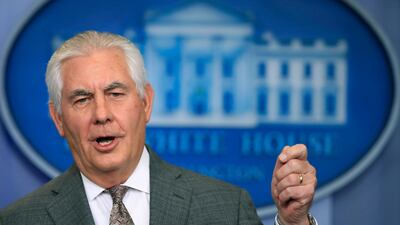The United States on Wednesday called the Myanmar military operation against the Rohingya population "ethnic cleansing" and threatened targeted sanctions against those responsible for what it called "horrendous atrocities".
"The situation in northern Rakhine state constitutes ethnic cleansing against the Rohingya," US Secretary of State Rex Tillerson said in a statement, using a term he avoided when visiting Myanmar, also known as Burma, last week.
"The United States will also pursue accountability through US law, including possible targeted sanctions" against those responsible for the alleged abuses, which have driven hundreds of thousands of Rohingya into neighbouring Bangladesh, he added.
The United States shifted its stance in part to raise pressure on Myanmar's military and civilian leaders, who have shared power for the past two years under an uneasy arrangement after decades of military rule, to address the crisis.
Rights monitors accused Myanmar’s military of atrocities, including killings, mass rape and arson, against the Muslim minority group during so-called clearance operations after Rohingya militants' August 25 attacks on 30 police posts and an army base.
More than 600,000 Rohingya Muslims have fled Rakhine state in Buddhist-majority Myanmar, mostly to neighbouring Bangladesh, since the crackdown, which followed the insurgent attacks.
_______________
Read more:
Urgent action needed on Rohingya crisis, UK minister to say
Emirati medical teams to treat Rohingya refugees
To place hope in defiant Aung San Suu Kyi seems futile
_______________
"These abuses by some among the Burmese military, security forces, and local vigilantes have caused tremendous suffering and forced hundreds of thousands of men, women, and children to flee their homes," Mr Tillerson said.
While repeating US condemnation of the insurgent attacks, he added: "No provocation can justify the horrendous atrocities that have ensued."
Myanmar's 2-year-old government, led by Nobel Peace Prize laureate Aung San Suu Kyi, has faced heavy international criticism for its response to the crisis, though it has no control over the generals with whom it shares power.
"It’s not a situation that is completely under her authority, but certainly we are counting on her to show leadership and also to work through the civilian government with the military to address the crisis," a senior US official told reporters in a conference call.
The term "ethnic cleansing" is not defined in international or US law and does not inherently carry specific consequences, a second senior US official said on the call.
Murray Hiebert, a Southeast Asia analyst with the Center for Strategic and International Studies think tank in Washington, said the State Department's use of the term and threat of sanctions "will likely have limited to no impact on the ground".
"It is likely to create more distrust between the United States and Myanmar's military and government and push them closer to China, Russia, and its more authoritarian neighbours in Southeast Asia," he added.
A top UN official in September described the military actions as a textbook case of "ethnic cleansing," but the United States until Wednesday had avoided the term.
Washington has sought to balance its wish to nurture the civilian government in Myanmar, where it competes for influence with China, with its desire to hold the military accountable for the abuses. US officials also worry that the mistreatment of the Rohingya Muslim minority may fuel radicalism.
Congressional pressure for a tougher US response to the Rohingya crisis mounted before President Donald Trump's first visit to Asia this month to attend a summit of Southeast Asian countries, including Myanmar, in Manila.
US government sources told Reuters in October that officials were preparing a recommendation for Tillerson that would define the military-led campaign against the Rohingya as ethnic cleansing, which could spur new sanctions.
In early November, US lawmakers proposed targeted sanctions and travel restrictions on Myanmar military officials.
Rights group Amnesty International called for a comprehensive arms embargo against Myanmar as well as targeted financial sanctions against senior Myanmar military officials.

